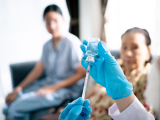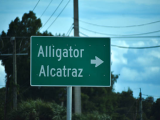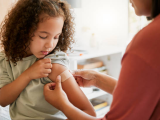Sep 21, 2009 (CIDRAP News) – The earliest results from testing of a pandemic H1N1 vaccine in children suggest that older children will get a good immune response with a single dose, but children younger than 10 are likely to need two doses a few weeks apart, federal officials said today.
The early findings, based on blood samples taken just 8 to 10 days after vaccination, demonstrate a response "strikingly similar" to children's responses to seasonal flu shots, said Dr. Anthony Fauci, director of the National Institute of Allergy and Infectious Diseases (NIAID), which sponsored the trial.
Seventy-six percent of children between 10 and 17 years old had a "robust" immune response to one 15-microgram (mcg) dose of the injectable vaccine made by Sanofi Pasteur, Fauci reported, calling the result "quite good." That dose is what's used in seasonal flu shots.
But among 3- to 9-year olds, the proportion with a good immune response (hemagglutination inhibition titer of 1:40) dropped to 36%, and in children between 6 and 35 months old it was 25%, he reported.
"The initial results are encouraging," Fauci said at a press briefing this morning. "As we had hoped, in the children the 2009 H1N1 vaccine is acting just like the seasonal flu vaccine."
The data suggest that one dose would be enough to generate a protective immune response in 10- to 17-year-olds but that younger children may need two doses, depending on their health history, Fauci said.
Advice from the Centers for Disease Control and Prevention (CDC) on seasonal flu vaccination for children from 6 months through 8 years old is that they should receive 2 doses if they have not had a flu shot before or had only one dose the previous season.
Fauci said no serious or unusual side effects were reported in the trial.
The report comes less than 2 weeks after preliminary findings in other clinical trials showed that adults had a strong immune response to single doses of H1N1 vaccines made by Novartis, CSL Ltd., and Sanofi. Trial results for MedImmune's nasal spray vaccine are still awaited.
Federal officials have been saying that young children will probably need two doses of H1N1 vaccine. That raises the prospect of some young children needing two doses of H1N1 vaccine and two doses of seasonal flu vaccine this fall to be considered fully immunized, Fauci acknowledged today.
Although trial results for the nasal-spray (live attenuated) vaccine have not yet been announced, Dr Jesse Goodman of the Food and Drug Administration (FDA) said today, "I think it is likely that younger children may need a second dose with that vaccine as well." The FDA last week approved the H1N1 live attenuated vaccine (LAIV) for children starting at age 2 and adults through age 49 (but not pregnant women).
Dr. Anne Schuchat of the CDC said children could receive seasonal and H1N1 vaccine injections on the same day, if both are available, but the CDC does not recommend that they get nasal-spray versions of H1N1 and seasonal flu vaccine on the same day.
"It's this question of how the immune system deals with a live flu virus," she said. "This additional H1N1 we don' think can be a separate one given the same day."
"Seasonal flu vaccine is already available, so parents can start getting children vaccinated now," Schuchat said. "I suggest starting now on seasonal."
The CDC predicted on Sep 18 that the first H1N1 vaccine doses to become available will be the MedImmune product, with 3.4 million doses expected to reach providers the first week in October. About 45 million to 50 million doses of vaccine, both injectable and LAIV, are expected to reach providers in mid October.
For children getting two doses of H1N1 vaccine, the recommended interval between them will probably be 21 days, the time used in the clinical trial, Fauci said.
He said the preliminary trial results showed no significant difference in immune responses to the 15-mcg and 30-mcg doses. "We have to remember that that was at 8 to 10 days . . . but at first blush there was not a significant difference."
The immune response to the vaccine will probably continue for several weeks following vaccination, the NIAID said.
The trial involved a total of nearly 600 children, but because there are three age-groups and two dosages, the findings reported today are based on small fractions of the total, the NIAID said. For example, there were 20 children between 6 and 35 months old and 25 3- to 9-year-olds who received a 15-mcg dose.
Officials did not say today whether they compared immune responses separately for those young children who had ever had a flu shot before and those with previous flu vaccinations. Online information about the trial says that children were excluded from the study if they had a flu immunization within the previous 4 weeks, but it does not mention excluding children with a less recent history of flu immunization.
Another NIAID-sponsored trial is looking at children's responses to H1N1 and seasonal flu vaccines when given at the same time or sequentially. Fauci said it will probably take until November to get "meaningful" results from that trial.
See also:
Sep 21 NIAID press release
http://www.niaid.nih.gov/news/newsreleases/Archive/2009/Pages/H1N1PedTrial.aspx
Aug 18 NIAID press release on launch of trials
ClinicalTrials.gov description of trial
http://clinicaltrials.gov/show/NCT00944073



















